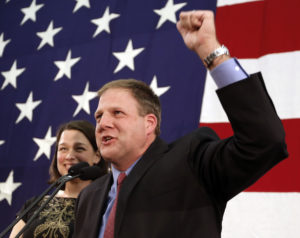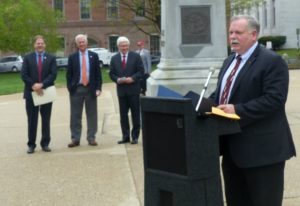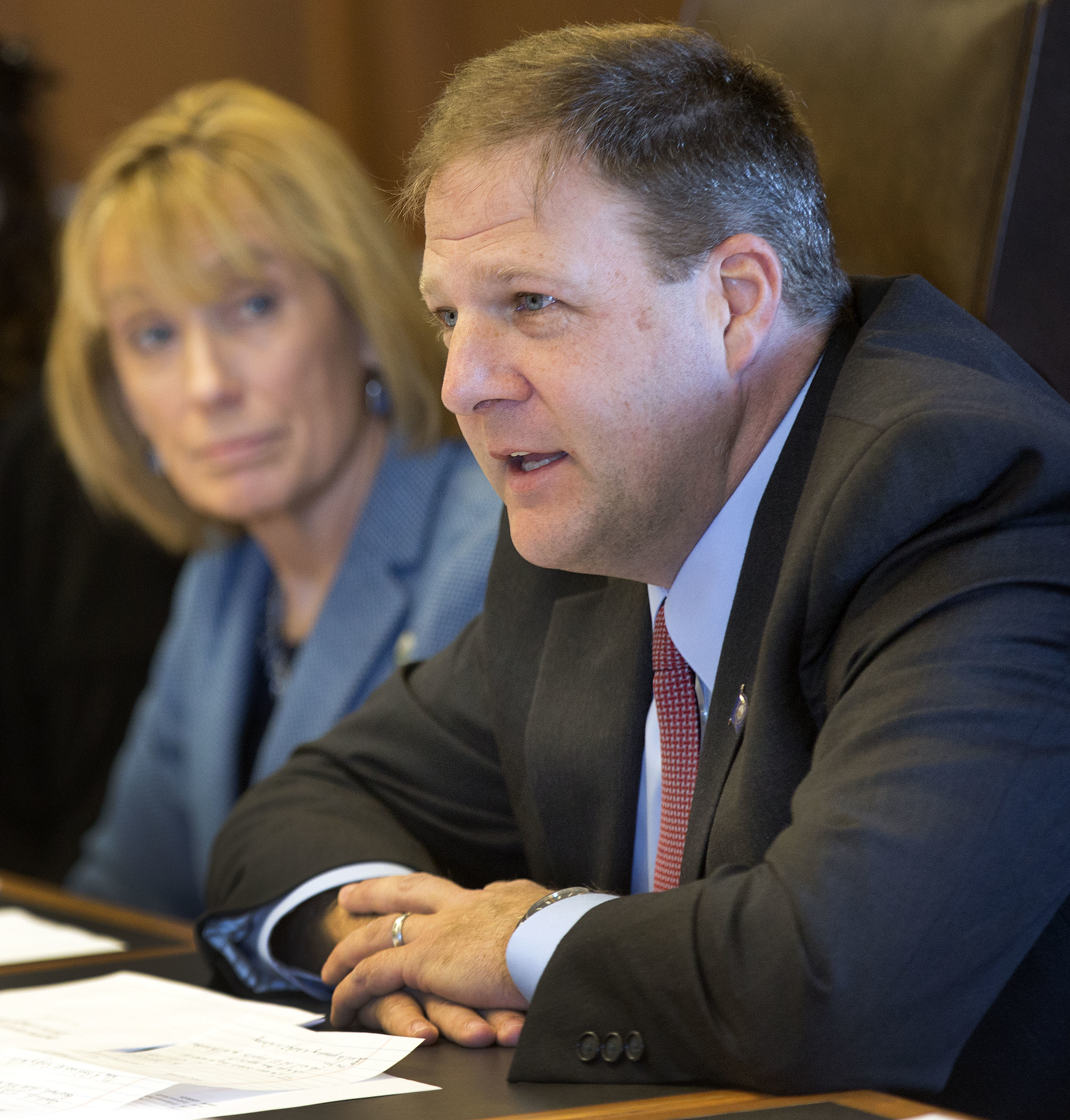The Winners and Losers of the New Hampshire Legislative Session

It felt like the last day of school at the New Hampshire State House on June 22. Lawmakers were signing each other’s session books (the political version of yearbooks), shaking hands, and taking pictures together. It had been another eventful legislative session that saw many highs and lows for Gov. Chris Sununu, the first Republican in the corner office in 12 years.
The Republicans didn’t always get along during this legislative session. Remember the defeat of right-to-work legislation and the House failing to pass their own version of a budget earlier this year? Despite the varied ideological depth of the New Hampshire Republican Party, they were able to show they can work together and give Sununu some final wins at the end of the first year of the 165th General Court, including full-day kindergarten and a budget getting passed.
Now, the lawmakers head home for the summer months and it’s time to decide the winners and losers of the session:
WINNERS:

With his wife Valerie at his side Republican candidate for governor Chris Sununu speaks to supporters early in the morning Wednesday, Nov. 9, 2016, in Concord, N.H. Sununu said his race with Democratic challenger Colin VanOstern was too close to call. (AP Photo/Jim Cole)
Gov. Chris Sununu: As much as Democrats wanted Sununu to not do well his first term in office, several of his campaign promises and policy priorities made their way through the legislature and became law. One of his first wins in office came from the repeal of a license requirement for concealed carry firearms. It was something he said he would do on the campaign trail, and it got done within the first two months of his term.
That’s not to say that Sununu didn’t have some setbacks during the legislative session. The governor, who didn’t have prior legislative experience before taking office, saw the defeat of right-to-work under his watch and the House failed to pass a budget for the first time in recent memory. Some critics claim Sununu could have done more to get right-to-work passed, but the Republican infighting revealed a divided party that would prove difficult for GOP leadership to navigate.
With the budget, Democrats attempted to paint Sununu as not in control of his own party, but Sununu actually stood as the most to gain from the House’s failure. The House cut several of Sununu’s budget priorities in its version, but when the Senate drafted its own budget, it used Sununu’s proposal as a guide. What was ultimately passed at the end of June was a compromise of House, Senate, and Sununu’s priorities.
On the final day of the session, Sununu also saw the passage of full-day kindergarten and a key school choice bill. It might not have been a perfect process, but the governor saw several items from his policy wish-list reach his desk.
Marijuana: For several years, New Hampshire has been the only state in New England that still criminalized possession of small amounts of marijuana. For many lawmakers, they saw a connection between the rampant opioid crisis and marijuana being used as a potential gateway drug. Historically, the Senate has voted down various bills relating to looser pot laws, but advocates fought long and hard to see marijuana decriminalization passed. After compromising with the House on an amount, the Senate finally found a bill that it could handle.
In June, the legislature decriminalized three-quarters of an ounce of pot and Sununu signed it into law. Marijuana advocates applauded lawmakers for taking the first step, although they are continuing to work toward full legalization.
Libertarians: The Libertarian Party of New Hampshire had a banner election year in 2016. It obtained 4 percent of the vote in the gubernatorial election to qualify for the ballot in 2018. It also had three sitting lawmakers switch their party affiliations from Democrat or Republican to Libertarian. The last time the Libertarian Party had an official caucus in the State House was in the 1990s when it had four members.
While Libertarians haven’t been the deciding votes on any controversial bills during the session, it is clear that some members of the major parties are unhappy within their own caucuses. The Libertarian Party needs to garner 4 percent of the vote again in 2018 to remain on the ballot, but with political partisanship at an all time high, voters could see Libertarians as a more moderate choice. That’s how many Granite Staters felt when they voted for Libertarian presidential candidate Gary Johnson over Republican Donald Trump and Democrat Hillary Clinton.

Gov. Chris Sununu signs HB 262, declaring the common blackberry to be the berry of the biennium. (Image Credit: Gov. Chris Sununu’s office)
Blackberry and painted turtle: Every year, the state’s fourth graders learn how the state government works, and every year, legislation gets filed on their behalf. This year, lawmakers saw a bill from students at Simonds School in Warner naming the blackberry the official state berry of the biennium. It made its way through the House and Senate, and Sununu signed the bill in June.
Another group of students from Main Dunstable School in Nashua wanted the painted turtle to be the official state reptile for the biennium. That bill was also signed by Sununu.
It’s an annual tradition at the State House and while some lawmakers believe it’s a waste of time, some say it’s a good opportunity to get students involved and interested in the political process.
Of course, no one will forget the time in 2015 when students in Hampton Falls proposed making the red-tailed hawk the state raptor and a lawmaker suggested the creature would be a better mascot for Planned Parenthood. That became a national news story.
Luckily, no incidents like that happened this year. And Sununu enjoyed snacking on some blackberries with the fourth-grade students when he signed the bill into law.
LOSERS:
Democrats: The New Hampshire Democratic Party struggled to find its footing this year. For the first time since 2010, Democrats were fully the minority party in the State House — Republicans had majorities in the House, Senate, Executive Council, and the corner office. The party couldn’t decide if it wanted to work with Republicans or be the party of resistance to their agenda.
Their lack of a mission or agenda was evident in the legislature. While Democrats banded together to help defeat right-to-work and the House’s budget, there were times when some members disagreed with party leadership and voted their conscience. When it became clear that it was very likely that a budget wouldn’t be passed in the House, some Democrats advocated for at least passing something on to the Senate.
While Democrats have long pushed full-day kindergarten, they didn’t like that the final bill tied its funding to the lottery game Keno. Most Democrats voted against it, and that could be a major policy issue when they face reelection next year.
But the question still remains: will Democrats work with Republicans in the next legislative session in January or will they resist? National politics will definitely influence their decisions, and it will also be an election year. More partisanship is likely.
 Right-to-work: The bill called for prohibiting unions from charging fees to nonmembers for the costs of representation, but even in a GOP-controlled legislature, Republicans couldn’t get the votes. A lot of different factors went into its defeat in the House, including disagreements between Sununu and House Speaker Shawn Jasper, as well as some Republicans who are part of unions or know people in unions. This was a major bill that some lobbyists and advocacy groups pushed for, including the Koch-funded Americans for Prosperity-New Hampshire. Simply, the votes were not there and lawmakers voted to not bring up the issue again until at least 2019, but expect to see another bill if the GOP retains its majority in the legislature.
Right-to-work: The bill called for prohibiting unions from charging fees to nonmembers for the costs of representation, but even in a GOP-controlled legislature, Republicans couldn’t get the votes. A lot of different factors went into its defeat in the House, including disagreements between Sununu and House Speaker Shawn Jasper, as well as some Republicans who are part of unions or know people in unions. This was a major bill that some lobbyists and advocacy groups pushed for, including the Koch-funded Americans for Prosperity-New Hampshire. Simply, the votes were not there and lawmakers voted to not bring up the issue again until at least 2019, but expect to see another bill if the GOP retains its majority in the legislature.
Transgender advocates: A controversial gender identity nondiscrimination bill was tabled in the House, much to the dismay of transgender advocates. The bill would have prohibited discrimination based on gender identity, extending gender identity the same protections under state law that exist for age, sex, sexual orientation, race, or creed. The protections would have applied to discrimination in housing, employment practices, and public accommodations.
House Speaker Shawn Jasper and other members of the GOP leadership sought to kill the bill, or at least get it off the agenda for the session. Their issue with the legislation mirrors the Republican opinion at a national level — the bill would have allowed transgender people to use the restrooms of their choice.
Advocates are hoping the bill could be resurrected next year.
Opioid crisis: The drug epidemic still has its grips on the Granite State, which is ranked as the second hardest hit state by per capita overdose deaths in the nation. Lawmakers passed some bills to help curb the crisis, but as with any legislative process, it can take a while for treatment and recovery centers to receive the necessary funds to make a difference.
The state is also now dealing with the rise of carfentanil, a synthetic opioid that is is so potent that it’s not intended for human consumption. It’s 100 times more potent than fentanyl and is commonly used to tranquilize elephants. There’s still a backlog at the state’s crime lab to investigate due to the increase in the number of drug overdose deaths.
While lawmakers seek political solutions for ending the crisis, advocacy groups say more creative solutions are needed, but it appears that the end of the epidemic is still not in sight.
UNDECIDED:
House Speaker Shawn Jasper and House Freedom Caucus: The conservative caucus threatened to kill the state budget unless their priorities were included. None of its members were on the conference committee to have a say in final negotiations, but House Speaker Shawn Jasper reached out to members to market the budget as a conservative one. Ultimately, some House Freedom Caucus representatives voted for the budget due to its inclusion of anti-abortion language and business tax cuts. But, Jasper’s control over the speakership is still in question. With defeats of right-to-work and a House budget, some representatives are questioning his ability to lead. If the GOP retains control in the House, expect several people to challenge him in 2018 to be speaker.
Sign up for NH Journal’s must-read morning political newsletter.











